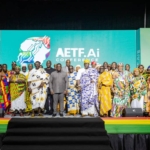
Ghana has hosted the maiden edition of the Africa Artificial Intelligence (AI) Conference, bringing together ministers, traditional rulers, religious leaders, students, policymakers, researchers, innovators, and investors to chart a new course for Africa’s digital future.
The Conference, organised by the Africa Education Trust Fund (AETF) at the Accra International Conference Centre (AICC) on November 5, 2025, was held under the theme “AI for Africa: Unlocking Opportunities for Education, Innovation, and Sustainable Development.”
The landmark conference featured exhibitions of AI-powered innovations in education, agriculture, health, and governance. It marked a pivotal moment in the continent’s technological evolution — one focused on ensuring that Africa defines its own path in the AI era.
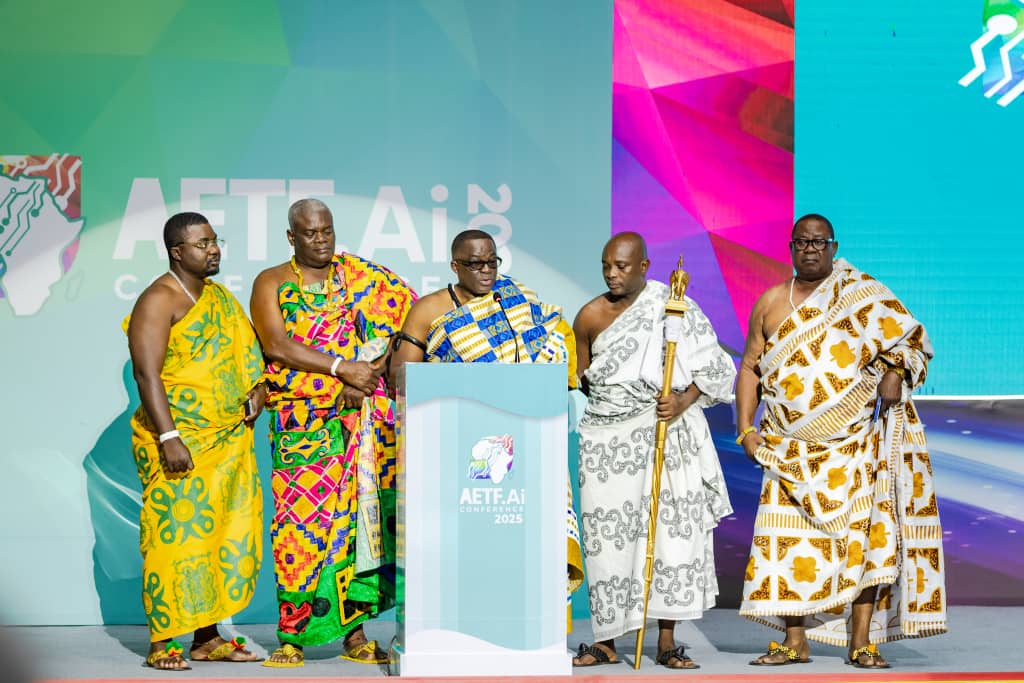
The various speakers explored topics such as: Education and AI Governance; Academia Industry Linkage, AI and How To Achieve The Pan African Vision Outlined in Agenda 2063; Business, Finance and AI; AI for Smart Urbanisation: The Rise of New African Cities; Discovering and Promoting Africa’s Young Innovators, among others.
Strategic Action
In a speech delivered on his behalf, Ghana’s Chief of Staff, Mr. Julius Debrah, called for decisive and strategic action to position Ghana as the Artificial Intelligence hub of Africa, emphasising that AI represents a historic opportunity for education, innovation, and sustainable development.
“The theme ‘AI for Africa: Unlocking Opportunities for Education, Innovation, and Sustainable Development’ is both timely and imperative,” he said. “Countries that harness AI are already seeing gains in learning outcomes, health system efficiency, agricultural productivity, and climate resilience.”
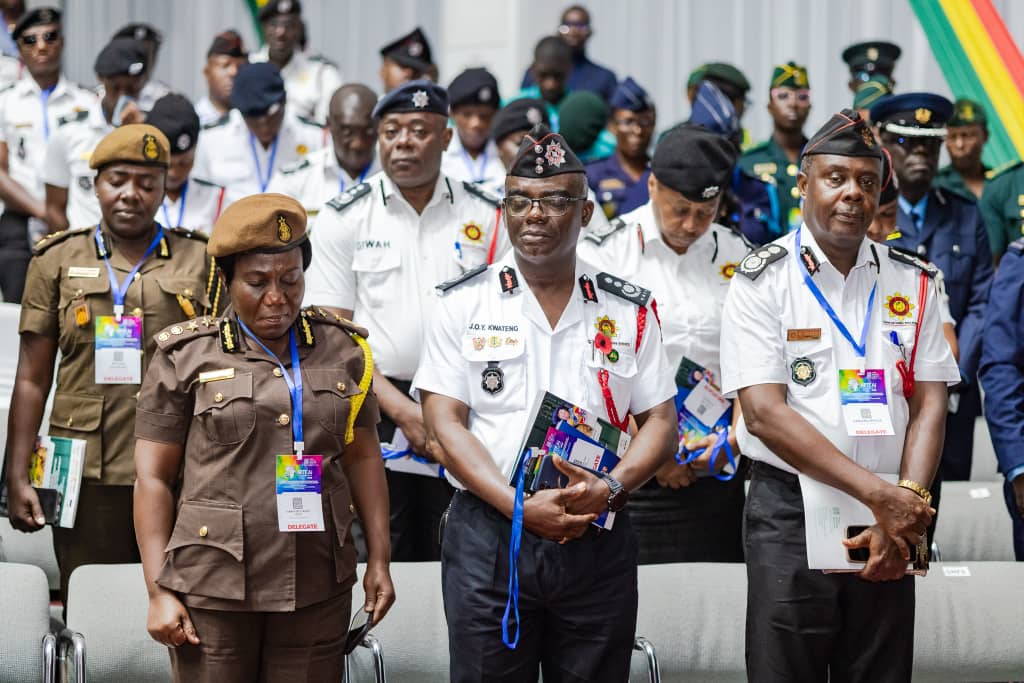
Mr. Debrah noted that “Artificial Intelligence (AI) has caught everyone’s attention because of its speed of enablement and disruption, embedding itself in our daily lives. It is shaping our classrooms, our farms, our hospitals, and our economies.”
Citing continental examples, he explained that “in Mali, AI tools are translating books into local languages, making learning more inclusive,” while “in Kenya, AI is bridging the gap for deaf students through sign language translation technologies.”
He further highlighted Ghana’s domestic commitment to the AI agenda, announcing the development of a National AI Strategy and initiatives such as the ‘One Million Coders’ programme to empower young Ghanaians with practical digital skills.
However, he cautioned that “the full potential of AI will not be realised with passive efforts,” urging investments in education reform, inclusive national AI strategies, and robust data ecosystems. “The future of AI in Africa is not a question of possibility but a question of purpose. Let us unlock the full potential of AI for every child in every classroom, for every farmer in every field, for every patient in every clinic,” he concluded.
Africa Must Feed Its Voice into Global AI
The Chairman of the AETF, Dr. Ekwow Spio-Garbrah, described AI as “a new frontier — one Africa cannot afford to miss.” He cautioned that if Africa fails to act swiftly, “our voices will be absent from the future.”
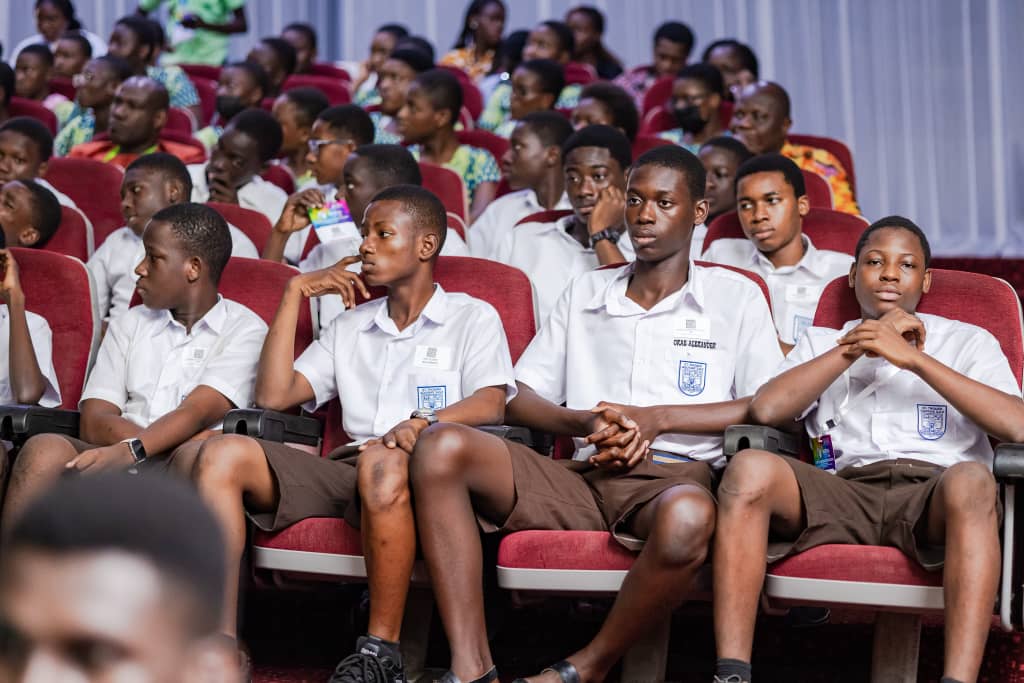
He stressed that “the real opportunity lies in data and applications,” urging African nations to focus on practical, results-driven projects that directly improve lives. “It is wiser to start small — with clear, results-driven initiatives — than to chase grand but distant projects,” he said.
Dr. Spio-Garbrah praised Ghana’s $50 million Innovation Fund as “a promising step,” and revealed that the AETF aims “to build on such models to create a multi-billion-dollar platform for Africa’s digital transformation.”
He further urged the continent to reshape its narrative: “Let us reshape the narrative — from a continent of limitation to one of limitless potential. Africa is not just a user of technology; we are the next frontier of innovation.”
Ga Mantse
The Ga Mantse, Nii Tackie Teiko Tsuru II, in a speech read on his behalf, made a passionate call for AI development rooted in African values and realities.
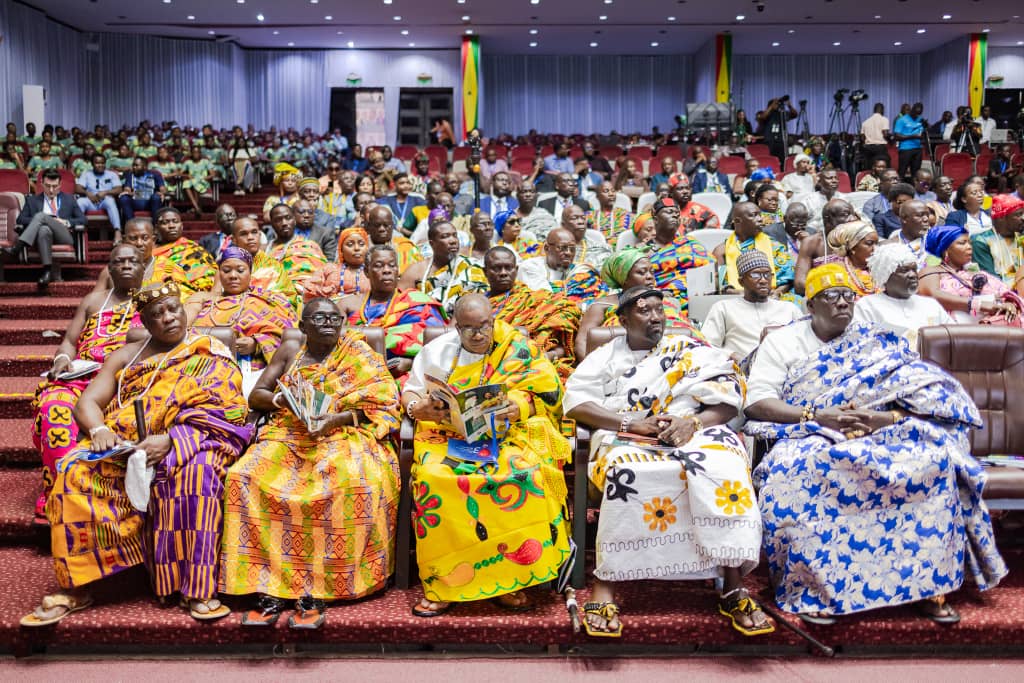
“The future of AI in Africa is not about machines. It is about our people, the people of Africa,” he said. “Artificial intelligence can transform how we learn, how we farm, how we heal, and how we govern, but only if it is filled with our values, our realities, and our people at its center. AI must work for Africa, and not merely on Africa,” the Ga Mantse, who chaired the conference, said.
He further urged African nations to move from being consumers of foreign technology to becoming creators and innovators, shaping their own technological destiny.
Legal Frameworks
Ghana’s Minister for Communications, Digital Technology, and Innovations, Hon. Samuel Nartey George, announced that the government is developing an Emerging Technologies Bill to provide a legal foundation for AI, Blockchain, and quantum computing.
“Our goal is not just digital transformation but a restoration of Africa’s technological sovereignty,” he said. “Once consultations and cabinet approvals are complete, the Emerging Technologies Bill will be laid before Parliament, hopefully next year. It will serve as the legal and regulatory basis for responsible innovation across AI and other emerging fields.”
He emphasized that AI innovation in Africa must be “guided by ethics, inclusivity, and cultural identity,” reaffirming government’s commitment to responsible technological advancement through “legal, ethical, and traditional frameworks.”
The Head of Office and Representative of UNESCO to Ghana, Mr. Edmond Moukala, urged African countries to integrate AI responsibly and inclusively. “AI can fuel local innovation ecosystems, enabling African researchers, developers, and startups to create context-specific solutions that address the continent’s unique challenges and capitalize on its abundant opportunities,” he said.
Founder and CEO of Margins ID Group, Mr. Moses Baiden, stressed that African nations need the political will to embed AI in “every facet of our lives,” emphasizing that educating African youth for AI participation is the most important decision Africa can make in the digital era.
Mr. Bright Simons, CEO of mPedigree, called for the discovery and promotion of Africa’s young innovators, describing them as key drivers of the continent’s digital revolution.
Ghana’s Minister of Sports, Mr. Kofi Adams, added that the time to make decisions to ensure that Africa becomes the future of technology and advancement is now. Africa cannot choose to stay behind while other people make decisions about how the world is run.
Defining Africa’s Digital Future
The AETF AI Conference served as a platform for collaboration between government, academia, and industry, exploring how AI can transform education, finance, agribusiness, energy, and governance — while creating pathways for Africa’s youth to thrive in the global economy.
At the close of the event, participants echoed a unified vision:
Africa’s digital transformation must be led by Africans, powered by ethical AI, and driven by education, innovation, and inclusion.
Sponsors and Partners
The sponsors and partners of the conference were:
Margins ID Group, ONESTA, Intelligent Card Production Systems, Glico, Minerals Income Investment Fund, Fidelity Bank, GCB, Bank of Ghana, College of Sustainable Transformation and Development.
About AETF
The Africa Education Trust Fund (AETF) was established through collaboration between the Association of African Universities (AAU), the Pan-African Chamber of Commerce and Industry (PACCI), and the Africa Private Sector Summit (APSS). It seeks to strengthen cooperation in education, trade, and investment across Africa under the Africa Continental Free Trade Area (AfCFTA).